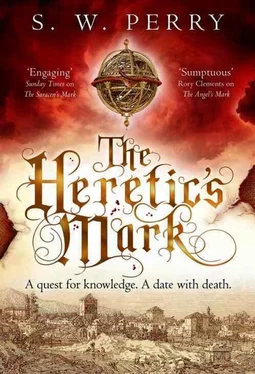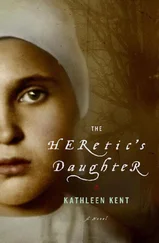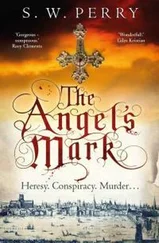‘But a heavy purse will draw thieves like a carcass draws flies.’
‘We’ll take just enough for our immediate needs.’
‘And when that runs out?’
‘I’ll ask Sir Robert to put the Cecil seal on a letter of credit. Antwerp might be Catholic, but she still trades with England, and the great banking families of Europe have agents there. We’ll not starve.’
Then there are the mundane practicalities of leaving Bankside. Who will ensure that the fingers of a carpenter’s mangled hand are straight and useable, rather than twisted and inflexible, if Dr Shelby is not there to splint them? How will the victim of a street robbery bear the pain of his beating if Mistress Merton is no longer around to provide a decoction of henbane and mandragora? Who will make the powder of cinnamon, myrrh, white amber and cassia lignea to help with a difficult childbirth? And if Dr Shelby is not on hand to diagnose a case of bladder stones, and Mistress Merton is not there to mix the fennel root, lovage, black peony and motherwort to dissolve them, how is relief to be found? There are few Banksiders with the money to bring in a physician from across the river. And anyone in Southwark claiming to have studied medicine at Oxford, or Cambridge, or Paris, Basle or Uppsala – or Thebes on the River Nile, for that matter – is without doubt a charlatan.
Throughout the next day Nicholas and Bianca attend to these and other questions. Nicholas returns to St Tom’s. He takes great pleasure in announcing his freedom to the warden, telling him that he won’t be around for a while as he intends to travel to Dover.
‘There’s no hospitals in Dover, Shelby – just whores, fishermen and sailors,’ the warden points out with a noisy sniff, as though this is the end he’s always imagined for Nicholas. ‘I trust you’ll not be after any of St Thomas’s mercury.’
‘No hospitals, but plenty of ships,’ Nicholas counters, explaining that he’s on his way to Paris to take up a position as physician to a rich Huguenot. Dover… Paris… the trail will have any Privy Council searcher tied in knots for weeks.
Leaving the warden to enjoy his sour jealousy, he seeks out a competent barber-surgeon he trusts. He offers the fellow enough out of his own purse to cover his twice-weekly consultations at St Tom’s.
Meanwhile Bianca enlists the help of some of the older women of Bankside. She chooses carefully: women of sound common sense who’ve spent a lifetime caring for children, husbands, parents; women she can trust to prepare a serviceable poultice, plastrum, syrup or tincture. She gives up a few of her secrets in exchange for a clear conscience. Then she sends Rose across the bridge to ensure a line of credit with an apothecaries’ merchant in Blackfriars who can provide ingredients.
But what to do about Rose herself? The woman can barely pass a minute without her eyes welling with tears, or loud snorting noises issuing from somewhere deep inside her misery. She has reverted to her former feather-brained self – the persona Bianca calls Mistress Moonbeam. Now Rose is forever misplacing or dropping things and getting her words jumbled up.
‘Ned and me… when you leave… that you’re safe… how shall we know…?’
‘Dry your eyes, Rose, dear.’
‘But how long…? You won’t even say .’
She is only partially mollified when Bianca requests that Rose writes to her husband Ned at Nonsuch, summoning him back to Southwark. ‘I’m entrusting the reconstruction to the Jackdaw to you both,’ Bianca tells her. ‘If Nicholas and I have not returned before it is completed, I want you and Ned to manage it for me. You may have our lodgings here, until the Jackdaw is fit for you to move into.’
Nicholas encloses Rose’s note in a letter that he writes to his friend John Lumley, asking him to release Ned from the Nonsuch household. He also asks Lord Lumley to read Rose’s words to her husband, because Ned does not have the learning to read them for himself.
Then there is the matter of what to carry on the journey. Nicholas has purchased a collection of pouches and bags from a saddler in Bermondsey. But what to put in them? For him, the choices are made within minutes: his sturdy white canvas doublet that has seen him through all manner of tribulations, three shirts, a change of under-breeches, a knife and spoon, a plate and, for defence against cut-pads and thieves – or, God forbid, any bounty-hunter the Privy Council might send after him – the wheel-lock pistol he brought back from Morocco, along with powder and ball.
Bianca, too, has little to take. Most of her belongings were lost in the arson that destroyed the Jackdaw. Since the fire she has purchased only two new kirtles, one of bottle-green linsey, the other of scarlet mockado, a damask doublet-bodice dyed a fine golden-yellow, two pairs of boots, a farthingale of canvas and whalebone (which will be utterly impractical on a journey on horseback) and some linen under-smocks, plus essential personal items such as a hair comb and eating utensils. Mercifully, on the day of the disaster she had left her favourite carnelian bodice at the Dice Lane shop. Her father had bought it for her on her eighteenth birthday. He’d chosen one of the best tailors in Padua, though he had been far from wealthy. It would have broken her heart to have lost that. That will have to come.
There are some items, she decides, that are frankly indispensable. She will not consider going without her own lip colouring, which she makes out of alum, cochineal and gum arabic. Nor will she forgo the little casket in which she keeps the cloves, candle-soot mixed with crushed alabaster and civet, and the application cloth that she uses to clean her teeth. A fugitive she may be, but a Paduan woman has standards to maintain, regardless of the current state of catastrophe.
But what to do about her father’s books and his silver Petrine crucifix, also saved because – thank God – they, too, were at Dice Lane?
The books are far too cumbersome and heavy to take. But the cross, on which a finely worked St Peter is being crucified upside-down because he feels unworthy to die in the same manner as his Lord, is barely six inches long. Sentiment, alone, would recommend it. And it could well be useful once they are across the Narrow Sea, adding credibility to the story Nicholas has contrived to explain their arrival in the Catholic territories of the Low Countries: that they are recusants, forced to flee from the cruel oppression of Elizabeth’s Protestant ministers. So the cross comes, too. Everything else – hers and Nicholas’s – goes into their wooden chest for safekeeping.
Deciding that the hardest leave-taking should be tackled soonest, she takes herself down Black Bull Alley to the little patch of ground she owns tucked away behind an ancient brick wall close to the riverbank.
She stands before the old, lopsided wooden door awhile before entering. The air here is heavy. It is freighted with the essences of a vast weight of muddy grey-brown water sliding past on its way to the sea, bearing with it the detritus of London: a cat that drowned at Esher; a memento that a grieving lover cast in at Kew; a shattered wheel from an old cart abandoned up at Richmond; a rack of rib bones from the shambles at Lambeth Palace; the hopes and fears – and yes, the waste – of two hundred thousand Londoners, and all those souls who people the riverbank along its journey from Avalon, or Eden, or wherever else the English think it rises.
But once Bianca steps inside her little physic garden the air changes. It seems to thrum to the competing scents of thyme and catmint, wormwood and lavender, and all the other herbs and plants she nurtures here, for her balms, concoctions and infusions.
And so she takes a sad farewell of the place she calls her ‘other heart’. The place where she can speak her most privy thoughts out loud and know they will receive a safe, warm, fragrant – and, most of all, unjudging – reception.
Читать дальше












